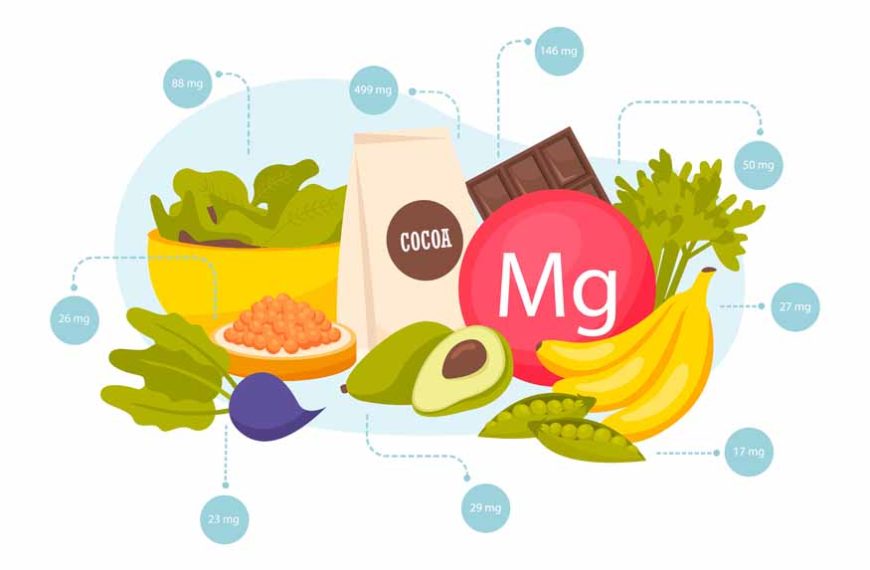Magnesium, a vital mineral for the human body, plays a crucial role in the growth and development of children. Its significance in health is often understated, yet it is involved in over 300 biochemical reactions in the body. For children especially, magnesium contributes to bone health, supports the nervous system, aids muscle function, and is involved in energy production. This blog will delve into the importance of magnesium for children, how to ensure they get enough from their diet, and the role of supplements.
The Importance of Magnesium for Children
Magnesium is essential for children’s overall development. It helps to build strong bones, which is particularly crucial during the years when children experience rapid growth. Magnesium also plays a role in nerve and muscle function, supporting everything from regular heartbeat to muscle contractions. Moreover, it assists in maintaining stable blood sugar levels and a healthy immune system.
Bone Health and Growth
Magnesium works in concert with calcium and vitamin D to strengthen children’s bones, which is vital during their primary years when bone density is developing rapidly.
Nerve Function and Sleep
Magnesium contributes to nerve function and has been linked to improved sleep patterns in children. Adequate magnesium levels can help regulate neurotransmitters that calm the nervous system, promoting relaxation and better sleep.
Energy Production
For active and growing children, magnesium is essential for converting food into energy. This process helps children to remain energetic and engaged in their daily activities.
Optimal Dietary Sources of Magnesium
Ensuring children receive sufficient magnesium through their diet is the best approach. Magnesium-rich foods include:
Green Leafy Vegetables
Spinach and kale are excellent sources of magnesium. Incorporating these into children’s meals, whether in smoothies or as part of a balanced dinner, can boost their magnesium intake.
Nuts and Seeds
Almonds, cashews, and pumpkin seeds are not only magnesium-rich but also contain healthy fats and proteins, making them an ideal snack for kids.
Whole Grains
Whole grains such as brown rice, whole wheat bread, and oatmeal are not only high in fibre but also a good source of magnesium.
Fish
Fish, particularly fatty fish like salmon and mackerel, provides magnesium alongside omega-3 fatty acids, which are beneficial for brain development.
Legumes
Beans, lentils, and chickpeas are not only packed with protein but also contain significant amounts of magnesium.
When to Consider Magnesium Supplements for Children
- Dietary Restrictions
- Specific Health Conditions
- Signs of Deficiency
For children with dietary restrictions or picky eaters who may not get enough magnesium through food, a supplement may be necessary. Always consult a healthcare provider before starting any supplement.
Children with certain health conditions, such as gastrointestinal diseases, which affect nutrient absorption, may require magnesium supplements.
Symptoms of magnesium deficiency can include muscle cramps, fatigue, and irritability. If you notice these symptoms, consult with a paediatrician to determine if supplementation is needed.
Choosing a Magnesium Supplement for Children
When selecting a magnesium supplement for children, consider the following:
- Form of Magnesium
- Dosage
- Quality of Supplement
Magnesium comes in various forms, such as citrate, oxide, and chloride. Some forms are more easily absorbed than others. Magnesium citrate, for example, is commonly recommended for its bioavailability.
The appropriate dosage of magnesium will vary depending on the age and weight of the child. It’s crucial to follow a healthcare provider’s guidance on this.
Choose a high-quality supplement from a reputable brand that has been third-party tested for purity and accuracy.
Precautions with Magnesium Supplementation
- Overuse
- Interaction with Medications
Too much magnesium from supplements can lead to adverse effects, including diarrhoea, abdominal cramping, and nausea. It’s important to adhere to the recommended dosage.
Magnesium can interact with certain medications, so it’s essential to discuss with a healthcare provider if your child is on medication.
Cognitive Development and Magnesium
- Brain Health
- Stress and Anxiety
Magnesium plays a vital role in brain health and cognitive development. It’s involved in neurotransmitter function, which can influence a child’s learning ability and memory. Adequate magnesium levels are associated with improved attention span, concentration, and calmness — factors that are essential for learning.
Children, much like adults, can experience stress and anxiety. Magnesium has been known to have a calming effect on the nervous system, which may help children manage stress more effectively. It’s sometimes referred to as nature’s relaxant, which can be beneficial for children who are prone to anxiety or hyperactivity.
Magnesium’s Role in Physical Activity
- Muscle Function
- Energy Metabolism
- Enhancing Magnesium Absorption
- Balanced Diet
- Cooking Methods
- Pairing Foods
For children who are active and engage in regular physical activity, magnesium is crucial for muscle function. It aids in muscle contractions and relaxation, helps prevent cramps, and can contribute to muscle recovery after exercise.
During play, sports, and other physical activities, children burn through energy reserves quickly. Magnesium is integral to energy production and can help maintain energy levels, keeping children active and engaged.
While including magnesium-rich foods in a child’s diet is key, ensuring that the body can absorb this mineral is equally important.
A balanced diet with adequate levels of vitamins D, B6, and minerals such as calcium and potassium can enhance magnesium absorption. Conversely, excessive consumption of sugary foods and drinks can inhibit it.
The way foods are prepared can impact the magnesium levels they provide. For instance, steaming or roasting vegetables can preserve more magnesium than boiling.
Pairing magnesium-rich foods with those high in vitamin C, like bell peppers or citrus fruits, can help increase absorption. Likewise, fermenting and soaking grains and legumes can reduce phytic acid, which binds to magnesium and hinders its absorption.
Recognizing Signs of Adequate Magnesium Intake
- Positive Behavioural Signs
- Physical Indicators
- Monitoring and Adjusting Magnesium Intake
- Incorporating Magnesium into the Family Diet
Children with adequate magnesium intake may exhibit signs such as a good attention span, regular sleep patterns, and overall good mood and energy levels.
Physical signs that a child may be receiving enough magnesium include good muscle tone, strong bones, and the absence of regular muscle cramps or twitches.
It’s crucial to monitor a child’s magnesium intake, particularly during growth spurts or when their activity levels increase. Parents and caregivers should be aware of their child’s dietary intake and adjust it according to their developmental stage and activity level.
Making dietary changes that benefit the entire family can ensure that children get enough magnesium. Meals that include a variety of whole foods, nuts, seeds, and green vegetables can cater to the whole family’s magnesium needs.
Consultation with Healthcare Professionals
Before adding supplements to a child’s diet, consultation with a healthcare professional is imperative. They can provide tailored advice based on the child’s specific health profile and nutritional needs.
Magnesium’s impact on a child’s health and development is profound. From supporting bone health to aiding cognitive function and physical activity, its benefits are widespread. Ensuring children receive an adequate amount of this essential nutrient through a balanced diet — and supplements when necessary — is a key component of nurturing healthy growth.
At EuroKids, we prioritise a holistic approach to child development, which includes nutrition education as part of our comprehensive curriculum. We encourage parents to explore the benefits of magnesium and all essential nutrients to support their children’s growth and development.
















